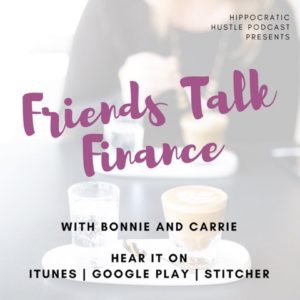Interviews
Welcome to another installment of Interviews with Real Female Physicians. The goal of this series is to share their story so that you, the reader, may learn and be inspired from their experiences – good and bad. We all come from different backgrounds and have different situations. Some of you are married, some are not, some with kids, some with blended families. Let’s show other women that any of these can work financially! So let's introduce our next woman physician rockstar – Amanda.
Tell us about yourself:
I am a soon-to-be 40 year old Pediatric Emergency Medicine physician. I've been married for 6 years with one little girl. I am from California and my husband is from Puerto Rico. We met in medical school and after being together for 7 years, we finally got married. We waited on having kids to be “ready”, and that was a mistake because it was harder than we thought to have a baby. We spent a lot of time dealing with infertility issues. Thankfully, we had pretty good IVF coverage so while we had to pay some of it out of pocket, we were definitely lucky and it didn’t financially ruin us. We trained on both coasts and finally settled in Phoenix, AZ just last year. We had been in NYC for several years and were happy to finally leave for a better quality of life. Our hobbies, like most people, are traveling. I personally like shopping and reading when I’m not so tired! I definitely feel like I picked the right specialty. I love the kids and never know what my shift is going to bring. There’s A LOT to be said about doing shift work and leaving your work at the hospital. My advice would be to do what you love and get paid for it. I have been an attending since 2012, and my husband, a cardiothoracic surgeon, since 2016.
Did you graduate with student loans? How much & what are the interest rates?
I was lucky enough to receive full tuition reimbursement from USC for 4 years of undergrad and 1.5 yr of grad school since my mother worked there. I graduated with around 250k in debt between graduate school and medical school – a combination of federal and private loans. The private loans were at an interest rate of 7%, and those were paid off in full (approx 80k) as a gift from my mother. The remaining – I have been chiseling at it and am finally under the 100k mark at a rate of 2.1275%. My husband graduated with no loans – all paid in full by his parents. We are very lucky because our loan situation is a best case scenario compared to what other physicians face.
How fast (or not) are you paying them off?
Given my interest rate, I am taking my time paying back the loans. We would like to purchase a house in the next few years, so all of our ‘extra’ cash is going towards that. My husband is more debt averse than I am, but between the CFP and myself, we have convinced him that rushing to pay off the student loan is not financially advantageous. I am set to pay them off in 2037, however as my husband reaches his financial peak in the next few years, I anticipate being able to pay them off much sooner.
Financial aspects of kids
When did you have them?
We had our baby girl in 2016. We hope to have another, but we are not sure that will happen given my age. I also have no desire to pursue infertility treatments again, given how unsuccessful they were, and now we have a HDHP which has no infertility coverage.
Are you planning to fund their college expenses?
This is where my husband and I disagree. He wants to fully fund and I’m ok with her taking out some loans. We currently have 2 529s, a UTMA and a Coverdell ESA. There is a possibility of me joining a employer who will fund 75% of her tuition if she goes to an AZ state school. This is 17 years away, so really hard to know if AZ will be our ‘forever’ place.
What are your child care expenses?
We have a nanny and pay her $2600 monthly. I know of too many daycare nightmares and just didn’t feel comfortable with it.
Financial aspects of marriage
Are you married?
Yes we are married.
Did you get a prenuptial or postnuptial agreement?
No – we talked about it but essentially came into the marriage with nothing on both of our ends.
Do you and your husband agree on finances?
For the most part yes. We agree on needing to discuss big purchases and the need to save. (In my mind, for retirement and in his, for our daughter’s education). My husband however is less worried about having enough for retirement. He believes in enjoying his life now because you never know what is going to happen. I however tend to plan for the long-term. This is why we have a CFP because we aren’t always on the same page.
Have you experienced a financial catastrophe?
Thankfully, no.
General Finances
What’s your FI (financial independence) number?
We haven’t decided at this time.
Who handles the finances in your relationship? Are you DIY or do you have a financial advisor?
I handle the $$ and we have a CFP.
What is your net worth?
We are net positive several 100k – our only debt is my loan which is now under 6 figures. This however will change once we purchase a home.
How are you saving for FI/retirement?
We currently have 2 x 401(k)s and 2 x Roth IRAs. Previously, we had 403(b) and a 457(b). We just learned about Roth IRAs last year. We are investing only in equities with very low or no fee index funds.
One thing you wish you knew:
In the medical profession, we take an oath to do no harm. We take our profession very seriously and we make personal sacrifices to help others. We take this for granted and assume that other professionals have the same work ethic and integrity. This is how we get taken advantage of – our financial naïveté coupled with our assumption that other people are honest and have our best interest in mind.
Do you have insurance?
Yes, we have disability, life, auto and umbrella insurance.
What does FI/retirement mean to you? What does it look like?
Freedom and peace of mind. Being able to help our daughter without a second thought.
Do you give to charity? If so, where and why?
We are working on this. My husband would rather give to his immediate family or people that he personally knows who need help than a random charity where those who need it may only see a fraction of the donation.
Any parting words of wisdom?
Don’t assume the same level of competence, honesty and ethics from someone giving you financial advice that you exhibit in your profession.
And … that's a wrap! If you're interested in doing this please send me an email – I'd love to hear from you!
I love that Amanda and her husband use a CFP to help mediate their financial differences. This is definitely one of the big reasons to work with one.]]>
Read MoreWelcome to another installment of Interviews with Real Female Physicians. The goal of this series is to share their story so that you, the reader, may learn and be inspired from their experiences – good and bad. We all come from different backgrounds and have different situations. Some of you are married, some are not, some with kids, some with blended families. Let’s show other women that any of these can work financially! So let's introduce our next woman physician rockstar – Liz.
Tell us about yourself:
Hi. I’m Liz. I’m an academic attending neonatologist 2 years out of fellowship training and I practice in Cincinnati, OH. 70% of my time is devoted to research. My pay is around the 25-30th percentile of other academic jobs in the area. I am married to a wonderful stay-at home-dad (SAHD) husband and we have a 3-year-old daughter with some special needs. I am happy with my specialty because I love my job, but it’s frustrating to get paid less than what most physicians make. Especially as the sole income earner. I’m doing better than general pediatricians, but I’m taking frequent call and dealing with very stressful situations. My colleagues in PICU are paid more and the discrepancy between my pay and adult intensivists is wide. If I had to do it all over again I would have gone into anesthesia or dermatology. I had the grades, board scores, etc, but neonatology had stolen my heart, so I’m in it until I burn out.
Did you graduate with student loans?
I graduated with $250,000 off student loans, most at 6.8% interest rate, that were in forbearance all through training. I do not recommend this. I didn’t know about PSLF until late in fellowship, and that was a terrible mistake. My husband also has about $60,000 in loans that are below 3%. I went to a public medical school specifically to save money. My parents were unable to contribute a dime to college or med school, so that influenced my decision. I had a great education and then went to top places for residency and fellowship. I have fully paid off my loans after a windfall I got after being hit by a car. I do not ever recommend this. I’m heading to a total knee replacement next month. But at least there’s a little silver lining. My husband’s loans are at such a low interest rate that we are slowly paying it off. 
Financial aspects of kids
When did you have them? Are you planning to fund their college expenses? What are your child care expenses?
We have one, and had a lot of difficulty having her, so I am not sure if two is in the future. I do not plan on making their 529s a priority until we are in a better situation with our finances. I did not have any money given to me for my college and I feel like it built a strong work ethic and I had no sense of entitlement. My husband became a SAHD shortly after my daughter was born, so the net cost of that is about $10,000 per year after accounting for lost income and not having to do day care. I had my heart set on public school because both my husband and I are products of public school, but with my daughter’s special needs, I’m not sure what we will do.
Financial aspects of marriage
Are you married? Did you get a prenuptial or postnuptial agreement? Do you and your husband agree on finances?
We are married, no prenup, and we agree mostly on finances and my husband stays at home. He had always wanted to do this and I am mostly happy with this arrangement. Therefore I am the sole breadwinner and it has caused no issues. My husband is the manliest man I know, but also one of the biggest male feminists I’ve met.
Have you experienced a financial catastrophe?
None except we both grew up relatively poor. We were extremely poor until just recently as my husband lost his job several times as I moved across the country to do training. 
General Finances
What’s your FI (financial independence) number?
Our FI number is around 2.5-3 million. We think living off of $100,000 per year is reasonable, which is how we reached that number. I will retire around 65, but probably won’t quit entirely for a few more years after.
Who handles the finances in your relationship? Are you DIY or do you have a financial advisor?
I mostly handle the finances. We have a great fee-only FA we found through the WCI list. She shares our same philosophies about passive investment with index funds. My partner and I both agree on this.
What is your net worth?
Probably around -$200,000 at this point, mostly due to mortgage debt.
How are you saving for FI/retirement?
We are maxing out my 403(b) and 457(b) at $18,000 per account. My work also puts 10% of my total salary into a separate retirement account. I’m using my HSA as a stealth IRA. We have one Roth IRA we’ve funded for one year. We also put part of our e-fund in a taxable account with a more conservative mix of index funds including bonds, international stocks, and total market funds.
Biggest financial failure:
Not knowing about PSLF.
One thing you wish you knew:
Get disability insurance as soon as humanly possible.

St. Lucia
Do you have insurance?
Due to my car accident issues and other health problems, I don’t qualify for any worthwhile disability insurance policies. I have ok long-term disability through work, but it’s only own occupation for 5 years. Still better than nothing. I’ve never had to use it. No life insurance yet, we do have a $1M umbrella policy.
What does FI/retirement mean to you? What does it look like?
FI/retirement means being able to work only when I want to. I’m pretty sure I’ll want to stop all clinical activities once I reach FI.
Do you give to charity? If so, where and why?
I donate monthly to Planned Parenthood and give intermittent donations to social causes I find important.
Any parting words of wisdom?
Get disability insurance as soon as possible, talk about financial goals with your partner before you get married, get a fee-only FA, use an HSA as a stealth IRA.
And finally, where can people connect with you?
You can find me on Twitter as @LizEnlowMD or Facebook Elizabeth Marie.
And … that's a wrap! If you're interested in doing this please send me an email – I'd love to hear from you!
I hope you enjoyed reading Liz' story. Her story is not only inspiring but shows that FI is possible even when life throws some unexpected wrenches along the way.]]>
Read Moreaunched a blog series where I interview other women physicians about their finances. This week, Chief Mom Officer interviews me as part of her “Six Figure Breadwinning Moms” series:
What’s the top three pieces of advice you’d have for someone just starting out in the workforce, struggling with their career, or just looking to improve how they handle their money?
- Live within your means. When your income increases, don’t increase your lifestyle in proportion. You lived on lesser income before, you can still do it.
- Learn the basics of personal finance and read at least one financial book a year. No one will care more about your money than you.
- The more money you have saved and invested wisely, the more choices you will have in life now and later.
Read the full interview here.

I also want to let you all know that Dr. Carrie Reynolds and I launched our bi-monthly podcast where we discuss all things finances. Dr. Carrie Reynolds @ Hippocratic Hustle (where she interviews female docs who are up to awesome things). You can find her podcast on iTunes. Our inaugural episode is here or search for “Hippocratic Hustle” on iTunes or you favorite podcast app. We discuss finance topics in a conversational way where we weave in our own experiences. We hope you enjoy it! We definitely are having recording them :).]]>
Read MoreI am super excited to launch this series to the blog! The goal of this series is to share their story so that you, the reader, may learn and be inspired from their experiences – good and bad. We all come from different backgrounds and have different situations. Some of you are married, some are not, some with kids, some with blended families. Let’s show other women that any of these can work financially! So let's introduce our first female physician rockstar – Michelle.
Tell us about yourself:
I’m a 41 year old dual boarded family medicine physician and psychiatrist who is currently working full-time in administration in a community mental health position in Southern California. I am 9 years out of residency and my husband, a full time hospitalist, is 11 years out. We are raising our three young children (2, 5, 8) with considerable support from family, childcare and a housekeeper. I feel very lucky to have a stable and loving family unit since there was a time that my life was pretty chaotic. I had the unfortunate experience of getting married and divorced within a year during the first year of medical school. On the upside my ex and I shared no assets and no kids, so I was lucky to get a fresh start when I met my current husband “on the rebound” as they say. This time though I wanted to be really, really sure so we dated through medical school and residency before getting married. We started our family when I was just out of training at age 31. We soon found out that starting a family though with two overworked, somewhat old physicians isn’t always a romp in the sheets. We ended up needing IVF to conceive each of our three babies. The cost of IVF was staggering since it wasn’t covered by insurance. We learned early on in our attending careers that we were not going to be the stereotypical rich doctors. Between a combined total of $300K in student debt and baby-making costing $25K a pop, our finances were tighter than our incomes would suggest. We could have made the decision to move to a low cost area, but both my husband and I are committed to paying our sun tax to live in this beautiful city. To do so, we’ve had to embrace that budgeting and planning our finances is part of the deal. I’ve packaged our story here pretty neatly but there were many twists and turns to get us to where we are today. Having said that, I’m very happy with many of the life choices we made along the way. I’m a dual-trained FM/Psych physician and healthcare integration is all the rage these days. There have been many good career options for me and now I’m in a fairly well paying administrative position (for public sector work.) Although I’ve lost much of my idealism of my early years, most days I feel like I’m doing the best I can to contribute to my community and serve patients that are usually largely underserved.Did you graduate with student loans? How much & what are the interest rates?
I went to a private college on a partial athletic scholarship. The other half was fully supported by my parents. I had no debt out of college. I paid for a state medical school using loans and really wish I had been more mindful to take out less. i graduated with $130K in loans. I was one of the lucky ones to come out at the right time and consolidate to a 2.8% interest rate with T.H.E loans which were great to work with.How fast (or not) are you paying them off?
I chose a 30 year payment plan which in retrospect was ridiculous. I thought with interest rates so low I should do it that way and could always pay ahead. I wasn’t motivated to pay ahead until recently. On the upside working in the non-profit sector has afforded me many loan repayment opportunities. I’ve had 50K paid back tax free by State loan repayment and over the next 2 years will have another 15K paid back. I’ve stopped paying and just keep applying for loan repayment programs.Financial aspects of kids
When did you have them?
As I mentioned above we started having kids just after residency. I’ve done okay on my career trajectory however my maternity leaves have delayed raises and I lost out on advancement opportunities I really wanted. I was actually told by the COO (and she is female!) “We thought of you for that position, but then I figured with your young kids the timing wasn’t good.” I think she was trying to be thoughtful, but boy did that make me mad!Are you planning to fund their college expenses?
We have a Utah 529 plan for each of our three kids. We started funding them are early ages, but we really wish we would have started them even before they were born. We’d like to fully fund the equivalent of state tuition, but we are funding our retirement as the priority. We’re adding extra as we can to get to our goal.What are your child care expenses?
We spend a small fortune on childcare and extra help with everyday household upkeep. I’m possibly the least domestic person I know and I outsource everything I can. We have hired a woman who helps with the kids and the general household upkeep for 23 hours a week. I’m just a doctor and a mom. I definitely don’t keep house. I have arranged my life to dedicate my time to the roles I enjoy most. It costs an arm and a leg, but it is worthwhile so that I get the downtime I need. Our kids also go to daycare. I love the structure and consistency of the hours of daycare. I love that the kids have a social group and can make friends there.Are your kids in private or public school? What is the cost including after care if needed.
Our kids are in public school. We choose our home based on where there are good schools. The housing prices are higher but at least that money is invested in the house. I’ve never had a good sense that private school gave any real life advantages so I figure we’ll only consider private school if there is some special consideration along the way for one of our kids.Financial aspects of marriage
Are you married?
I joke around and say that my first marriage didn’t stick. It was over in a blink while my head was buried in my books while my ex-husband was off with one of his co-workers. I left the situation as fast as I could and just took a few belongings off to my own apartment on campus for $125 per month that my family paid for a few months, so I could sort it all out. That was the best decision of my life right there. I lost everything to gain everything I have now. I met my current husband in medical school – I've made a much better selection!Did you get a pre-nuptial or post-nuptial agreement?
We didn’t. We had no assets.
Do you and your husband agree on finances?
My husband and I were both raised in fairly affluent (upper-middle class) communities. However there was big difference in the way our parents talked about money. My husband's parents basically never wanted their kids to be worried about money and wanted their kids to know that they would always support them. My father-in-law lost his father at the age of 13 growing up in Iran and found himself fending for himself at a young age. Fortunately he was taken in by other family members, but the fear of poverty was something he never wanted his own kids to experience. My father by contrast, was very frugal and rarely spent money on extras though we knew we had money and lived in a nice area, with a nice house and good schools. I was told not to order a drink with dinner at restaurants since that was too expensive. I was told many times “We don’t have enough money for that.” So needless to say, my spending patterns are very different from my husband. It was never much of an issue because we both made good salaries and didn’t really understand or see that we weren’t saving for our future or the futures of our kids. It wasn’t until I sort of randomly fell upon our female physician finance Facebook group that I started learning how little I knew. We had been working with a fee-based Financial Advisor up until that point and not once had she pointed out that our spending patterns were awful and not once was she clear with us that we needed to save more than we were. Various members posted some links to the White Coat Investor and I’d have to say that was a pivotal moment in my financial life. At that time I ordered the book and really have been on a learning journey since. This is sort of where the rubber hit the road for my husband and I. Up until that point his spending didn’t worry me since I figured “We are doctors, we make good money, what’s to worry about.” I started learning about personal finance and then I started getting very concerned that my husband and I were not going to be able to retire until age 90 and our children would get little to no support for college. My husband wasn't very interested in personal finance and to this day he is not. We do have a very good relationship and he trusts my intelligence and general ability to navigate life. So when I started to explain that we were woefully behind in our retirement and college savings, he did believe me. The trouble is that he wasn’t very interested in changing his spending. So I started reading some articles about how to get your spouse on board with finances. I was able to get him to agree to once a month couples meeting about our finances. During the meeting I’d outline our finances and show him the various calculators showing where we needed to be. He started understanding that where we needed to make some changes. He still had no real interest in reading or doing our budget, etc. I asked him how did he think he could cut back his spending and he said “Well, when the money is gone I always stop.” Fortunately, he didn’t have an issue with credit card debt. So from this we came to the agreement that I’d manage our finances and that we’d get him a pre-paid debit card. We put a fixed amount of spending money on the card each month and when it is done he stops. All other family spending are driven by our budget which I created and maintain (shout out to the world’s best budget software YNAB!!) In 5 months time from starting YNAB and my husband’s debit card we were funding a lot more in our retirement accounts, contributing more to college accounts and our cash reserve has quadrupled. I think my husband secretly likes the security of knowing we are on track financially and that our kids will be well supported in college. [Wow! How inspiring is this!]If you are divorced – what have you learned financially from this, and what advice would you give to unmarried women planning to marry?
I learned that I was extremely lucky to have family support to get me out of a bad situation. My advice to all women married or not is never be in a situation where you don’t have your own access to emergency funds. I was a first year medical student living off of loans and had no emergency pot set aside for me to access.Are you the breadwinner?
No, we are equal financial partners.Have you experienced a financial catastrophe?
See my first marriage & divorce, above.
General Finances
What’s your FI (financial independence) number?
FI #: $4 million. My goal is to reduce our lifestyle consumption in hopes for the number to be lower. I want to live more simply but haven’t yet achieved that.Who handles the finances in your relationship? Are you DIY or do you have a financial advisor?
For years, I thought “handles the finances” meant who does the bills. And that answer would have been my husband. He still “does the bills” which these days means he sets up the accounts for automatic payments. These days though I understand finances so much better than I used to. I don’t manage the autopay as a part of doing the finances, but I can comfortably say that I do 90% of our financial planning. My husband does the taxes. We had a financial advisor for about 3 years and although I can credit her with introducing me ideas, I would have been way ahead of where I am now had I learned the information on my own or used a fee-only FA rather than a commission based FA that I used.What is your net worth?
Well, let me go peak at Personal Capital! If I take out my 529s, we have $500K not including equity in our home. The approximate the equity we have in our home minus the mortgage would probably be an additional $250K.How are you saving for FI/retirement?
My husband has a pension plan, 403(b) and 457(b). For years, we didn’t know that he wasn’t maximizing his space. When I looked last year and figured out that he wasn’t, we changed that to maximize the $36K (plus his pension contribution.) We are not yet funding Roth IRAs. We have his funds invested in a low fee target fund which is his lowest fee option. We make the allocation more aggressive by pushing out the retirement day. I currently have a pension plan, 401(a) and a 457(b). I am contributing $9K yearly to the pension, $41K into my 401(a). I’m not yet utilizing my 457(b) or funding a Roth IRA.One thing you wish you knew:
I wish someone would have told me that there are more bad FA than good ones. I really wish I would have found a good one from the start. I also wish someone would have told me that learning about this doesn’t make you greedy and money centric. It just means that you’ll be independent and not a burden to your children in future years to come. That’s not a selfish thing.Do you have insurance?
We have solid life insurance and umbrella insurance, but really have been risky about not taking out disability insurance. Our rational is that if my husband gets disabled we could manage on my incomes (which is realistic, finally.) And if I get disabled we can live on his. If we both get disabled we’re screwed. I feel comfortable without it for myself (even if I ended up single again) since I’m non-clinical and have an office job. Most office job folks just use their employer's disability insurance. My job isn’t any different than a lawyer or or other professional so I just don’t feel strongly about having job-specific policy now that i’m non-clinical.What does FI/retirement mean to you? What does it look like?
FI means that I don’t have to work any more. I imagine that when I hit this number I will reduce my hours to just the amount that I feel like working. Then I imagine I will want to stop all together if my kids have kids. I’m hoping to be a stay-at-home-grandma if my kids would like help with raising their own kids since I was a working mom. I’d love to be present for my grandkids and support the careers of my children.Do you give to charity? If so, where and why?
Not much just here and there for work and school fundraising events.Any parting words of wisdom?
We all carve out time in our busy lives for our priorities. I wish learning personal finance would have been higher on my priority list at a younger age. I had the notion that somehow learning about money was only of the money-hungry, superficial types. I wanted to be above that. In retrospect that was so naive.And … that's a wrap! If you're interested in doing this please send me an email – I'd love to hear from you!
I loved reading Michelle's story and I hope you did too. I was totally inspired about reading how she was able to take control of her and her husband's finances and get on track for financial freedom.]]> Read More- « Previous
- 1
- 2
- 3








